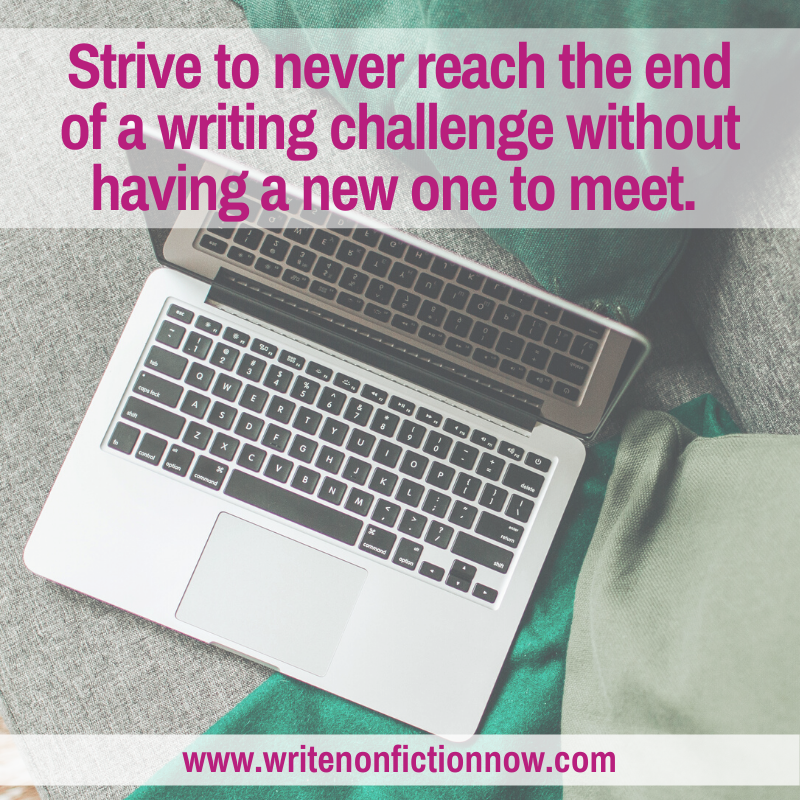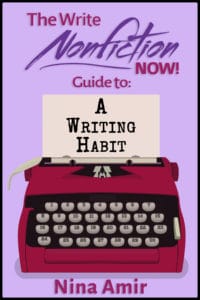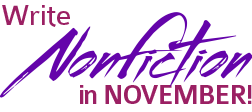 You’ve come to the end of a 30-day nonfiction writing event, like the Write Nonfiction in November (WNFIN) Challenge, and you reached your goal. Pat yourself on the back, and then sit back down at your computer. Typing “The End” just means you need to start writing again—this time on a new project. In other words, one writing challenge may have ended, and now a new one begins.
You’ve come to the end of a 30-day nonfiction writing event, like the Write Nonfiction in November (WNFIN) Challenge, and you reached your goal. Pat yourself on the back, and then sit back down at your computer. Typing “The End” just means you need to start writing again—this time on a new project. In other words, one writing challenge may have ended, and now a new one begins.
You see, you’ll never reach the end of a writing challenge…not if you treat every month as if its a 30-day nonfiction writing challenge. And that’s the key to continuing the productivity and creativity roll you’ve been on for the last month.
No More Excuses
Here’s the thing: You can no longer make excuses about why you can’t write. You just proved to yourself that you can write—when you set your mind to it.
You found the time. You got in the flow. And you produced words…lots of words. And you met your goal. Maybe you even finished the first draft of an entire manuscript. And you did that in 30 days.
You are living proof that you can do it. You stepped up the challenge and met it.
Now…go do it again.
Exercise Your Writing Muscle
Writing is like a muscle. It needs exercise to make it strong.
You gained a bit of strength this past month, but it will quickly disappear if you just stop writing. The muscles will atrophy, and before you know it, you’ll feel like you have to start from scratch.
Instead of two hours of writing per day, you’ll struggle to write for 15 minutes.
So, now that you’ve made progress, just like if you were working out at the gym, it’s time to pump up your writing. Lift heavier weights—like a longer writing project—or gain endurance–by writing for a longer period each day.
Whatever you do, don’t stop using your writing muscle.
Strengthen the Habit
 Going to the gym is a habit. After a month, putting on your workout clothes and doing the workout feels easier. Stop for a week, though, and you’ll find yourself reticent to go to the gym. Your habit will fall away fast.
Going to the gym is a habit. After a month, putting on your workout clothes and doing the workout feels easier. Stop for a week, though, and you’ll find yourself reticent to go to the gym. Your habit will fall away fast.
It takes 66 days or more to build a habit—sometimes over 200 days. And a habit is an automatic behavior—something you don’t have to think about. You just do it.
Are you automatically sitting down to write? Or do you still think about it, remind yourself, negotiate with your mind, or procrastinate? If writing is not yet an automatic behavior, you do not have a habit. That means you need to continue on as if you were still in the midst of a month-long writing event.
If you stop writing now or even slack off, you’ll find yourself back at square one. Remember how hard it felt at the beginning of your 30-day nonfiction writing challenge? It was really tough, right?
But now…at the end of the challenge…it’s feeling easier to write consistently. Build on that by continuing to write consistently until you have formed a strong habit.
Learn to Love the Practice
In There is No Plan B for Your A Game, Bo Eason talks about pockets of greatness. These are unlikely environments for producing one or more people who are the best at what they do. Yet, there are locations around the world that produce world-class gymnasts or soccer players, for instance, despite lack of equipment, money, or coaching.
The reason for this is simple: The people who practice in these dingy gyms, swim in these tiny pools and play in narrow alleys enjoy practice more than performing. They put importance on the amount of time they work towards being great.
Their dream of being the best drives them to overcome any adversity before them. They tenaciously refuse to be average or mediocre. These people willingly give things up, develop new habits, and do whatever it takes to become great—in their own eyes and, then, in the eyes of others. And they put in tons and tons of hours of practice because they love what they do.
These people wouldn’t do a month-long challenge related to their passion only to slack off at the end. Instead, they’d raise the bar and repeat the challenge. They’d push themselves farther and faster.
Imagine that you exist in a pocket of greatness. Despite the hardships and adversity, practice writing. And then practice some more.
The Unending Writing Challenge
In my ebook, The Write Nonfiction NOW! Guide to a Writing Habit,, Mridu Khullar Relph, an author and award-winning journalist, explains how she creates a writing production schedule for the year. When she finishes one project, she immediately begins working on the next one.
In this way, she never stops writing. She just closes her Word or Scrivener file when she reaches the end of a manuscript and opens a new one. She then starts working on the next project in the schedule.
See the end of the WNFIN Challenge as just one project scheduled in your production schedule. With your WNFIN project complete, it’s time to move on to the next one.
Strive to never reach the end of a writing challenge—at least not without having a new one to meet. Create a new writing challenge for yourself. Rise to it. Then rinse and repeat…over and over again.
How will you create an ongoing nonfiction writing challenge for yourself? Tell me in a comment below. And if you found this post helpful, please share it with a friend who writes.
 This post is part of the 2019 Write Nonfiction in November (WNFIN) Challenge, also known as National Nonfiction Writing Month (NaNonFiWriMo). Find out more about how to participate by clicking here. The event is sponsored by the Nonfiction Writers’ University. Get a 1-week trial membership for just $1!
This post is part of the 2019 Write Nonfiction in November (WNFIN) Challenge, also known as National Nonfiction Writing Month (NaNonFiWriMo). Find out more about how to participate by clicking here. The event is sponsored by the Nonfiction Writers’ University. Get a 1-week trial membership for just $1!